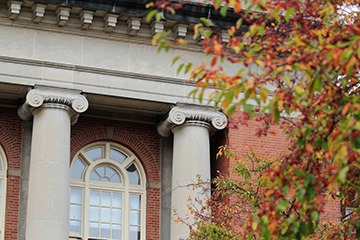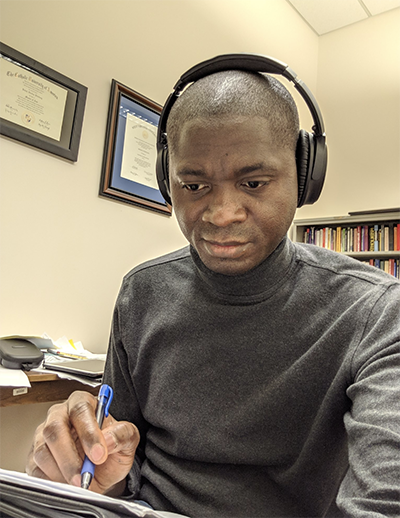
10/15/2020
SUNY Cortland professors are teaching during an unprecedented semester created by the COVID-19 pandemic. Through all of the challenges, faculty members have stayed dedicated to their craft in attempt to create meaningful experiences for their students. This profile continues a five-part series.
When students email a question to Bekeh Ukelina late at night, they’re sometimes surprised to receive a reply from their history professor after midnight. He wants students to know that he’s available.
“One of the most important things in my classes is open communication,” said Ukelina, an associate professor who is teaching four fully online classes with both synchronous and asynchronous lessons.
Students discover early in the semester that they often can reach Ukelina on Slack, an online communication platform, for immediate answers. But he expects a similar level of dedication in return during live classes on Zoom. Students are required to keep their cameras and microphones turned on to fully engage in the conversation.
 |
| Bekeh Ukelina, an associate professor of history |
“I don’t want passive learners,” said Ukelina, whose courses cover global history topics such as slavery and youth protest movements of the 20th century.
Ukelina has taught online for 10 years, so he brought valuable experience into the semester. Lectures and assignments cannot be a carbon copy from the traditional classroom. In several classes, he has focused on assigning shorter papers with greater frequency as a way to teach student how to synthesize important information concisely. Ukelina also said it’s crucial not to assume that students are experts on every technology platform.
Ukelina has observed an uptick in the quality of student participation, especially among students who are traditionally shy to speak in the classroom, because asynchronous discussions allow more time to collect their thoughts and articulate them in writing.“Building a spreadsheet on (Microsoft) Excel is more complicated than swiping on a phone,” he joked.
He said he looks forward to connecting SUNY Cortland students with others across the globe, even after the pandemic is over. Ukelina planned to travel to Russia this past summer to teach a class for the St. Petersburg Institute of Linguistics, Cognition and Culture. After the program moved online, more scholars joined. Ukelina taught students from India, Pakistan, Nigeria and Germany.
“Those are students we wouldn’t have had in Russia,” he said. “I want a student in Ghana to take the African history course that I’m teaching in Cortland. I want to open up that space.”